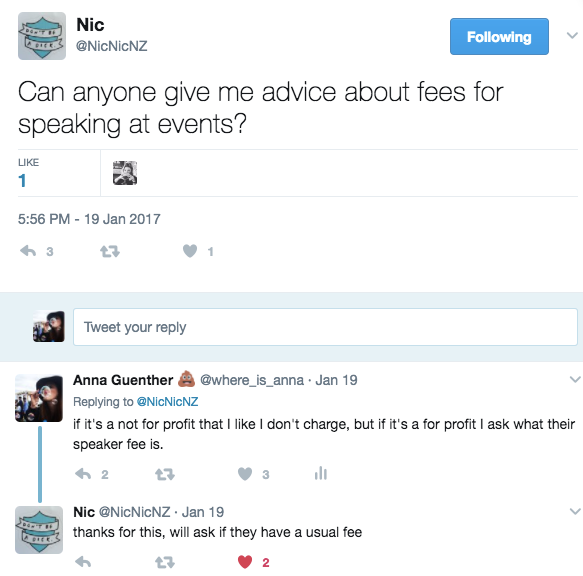
There’s nothing that annoys me more* than corporate events telling me they have no budget to pay for me to speak. They seem fine charging people hundreds if not thousands of dollars to attend their event, pay sound engineers and caterers, and pay themselves for the time spent organising — but when it comes to the inspiration and education that they are selling their event on, they’re broke.
Don’t get me wrong, there are a lot of events I choose to speak at my own expense (covering travel, time, and anything else to get me there) but typically that’s for fundraisers or charities. They need the money more than me, and I want to support their kaupapa. But, if you’re a company making money off my time, I expect to be paid.
It wasn’t always that way
It didn’t start out that way though. I thought every speaking event was a miracle. Someone wanted to hear me? I couldn’t fathom why. So I said yes, I went along, and I never ever questioned if anyone else presenting was being paid. Because I was getting exposure! Turns out, you can’t eat exposure though, or pay rent with it.
It wasn’t until an off the cuff comment from my friend Marianne Elliott that I realised not only were most of the other people speaking getting paid, but that I could and probably should be paid too.
She taught me one simple question to ask: “what’s your speaker fee?”
If they come back with no budget
Then it’s up to me to decide if they align with the types of work I want to support. If it’s a charitable fundraiser, or a group whose work I value, or if they cover my travel, I’m more likely to support.
If I know they’re being paid to organise the event though, then I’m less likely to speak for free.
One trick I’ve learned, if it’s in an area that I’ve been paid in the past (eg. lecturing university students) I’ll go back with an example of what I’ve been paid in the past. This recently happened with a university programme, and when I told them what I had been previously paid for speaking ($350+GST), they decided to match that fee. Even more interestingly, the organiser then realised that by paying for my time she was more focused on what she wanted out of my presentation. I showed up prepared to cover the topics she wanted her students to hear, and they valued my time more.
If they come back and ask what my fee is instead
I say the highest amount I’ve been paid: $1,000 for a 15-minute talk, and my travel fees + accommodation covered (including a place to work before / after the event). If the event is a plane ride away I require accommodation, because otherwise it’s a hell of a day (at least four hours of travel if not more) and I won’t get any time around the event to hang out with people that were there.
Another trick my wise friend taught me was to check that price with my friends as well. See if I know anyone who has spoken for that event in the past, and check what they were paid. She has a circle of friends that actually shares speaker gigs amongst themselves, and what the proposed pay is, and if the group thinks their friend is being underpaid they make them go back and ask for more.
For all that’s good, we need more transparency
The thing that frustrates me though, is there’s no transparency around what event organisers are paying, and a lot of people don’t even know they should be asking. I realised this when Nic from Good Bitches Bake tweeted out asking:

I went back with what I do, and with that advice in hand, she not only managed to get paid, she got a revenue share of the ticket sales donated to her charity.
I had another friend keynote an event I spoke at. I was getting $1,000 for my slot (which was a workshop in a stream of workshops). She hadn’t asked what the speaker fee was, and wasn’t offered anything. It was only over wines later that she found out I had been paid, which made us both angry.
If you’re paying some of your speakers, as an event organiser, shouldn’t you try to make things fair? Shouldn’t you want to value the people giving up their time, intelligence, and energy? It shouldn’t have to come down to us asking.
My top tips
-
Don’t speak for free, unless it’s an organisation you love who can’t afford to pay you, or a charity you want to support
-
Ask what the speaker fee is in your first email
-
Check with people you know if that speaker fee is reasonable
-
Don’t be afraid to name/shame organisations that refuse to pay.
-
Speaker fees don’t have to be cash (it could be tickets to the event) and don’t need to be paid to you (you could choose to donate it!)
-
If you’re an organiser: Be transparent. Realise that you have the power to help right some of the pay gap wrongs with the work you’re doing here, and that it will make your events better. If you expect people to speak for free, you’re only going to get a certain type of person able to come (eg. super privileged). By offering a set speaker fee transparently, you’re likely to get more diverse speakers.
I hope this blog helps. Please, share your own experiences, tips and tricks in the comments below.




